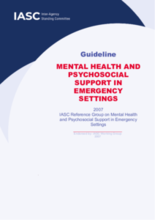Armed conflicts and natural disasters cause significant psychological and social suffering to affected populations. The psychological and social impacts of emergencies may be acute in the short term, but they can also undermine the long-term mental health and psychosocial well-being of the affected population. These impacts may threaten peace, human rights and development. One of the priorities in emergencies is thus to protect and improve people’s mental health and psychosocial well-being. achieving this priority requires coordinated action among all government and non- government humanitarian actors.
A significant gap, however, has been the absence of a multi-sectoral, inter- agency framework that enables effective coordination, identifies useful practices and flags potentially harmful practices, and clarifies how different approaches to mental health and psychosocial support complement one another. This document aims to fill that gap.
These guidelines reflect the insights of practitioners from different geographic regions, disciplines and sectors, and reflect an emerging consensus on good practice among practitioners. The core idea behind them is that, in the early phase of an emergency, social supports are essential to protect and support mental health and psychosocial well-being. In addition, the guidelines recommend selected psychological and psychiatric interventions for specific problems.
The advocacy package is part of a campaign to encourage all humanitarian actors and UN Member States affected by, or at risk of, emergencies to embrace and implement the IASC MHPSS Guidelines. It also highlights the progress made by countries that have already implemented them.
The guidelines include key activities for the campaign such as advocacy events, developing plans of action, coordination tools and checklist to identify gaps. It also includes key messages and ideas for implementation to communities, governments, donors, UN organizations and NGOs. The guidelines can be used as:
1) A guide for programme planning and design
2) Advocacy for better practice
3) Resource for interventions or actions
4) A coordinating tool
5) Checklist to identify gaps
View all translations here.

